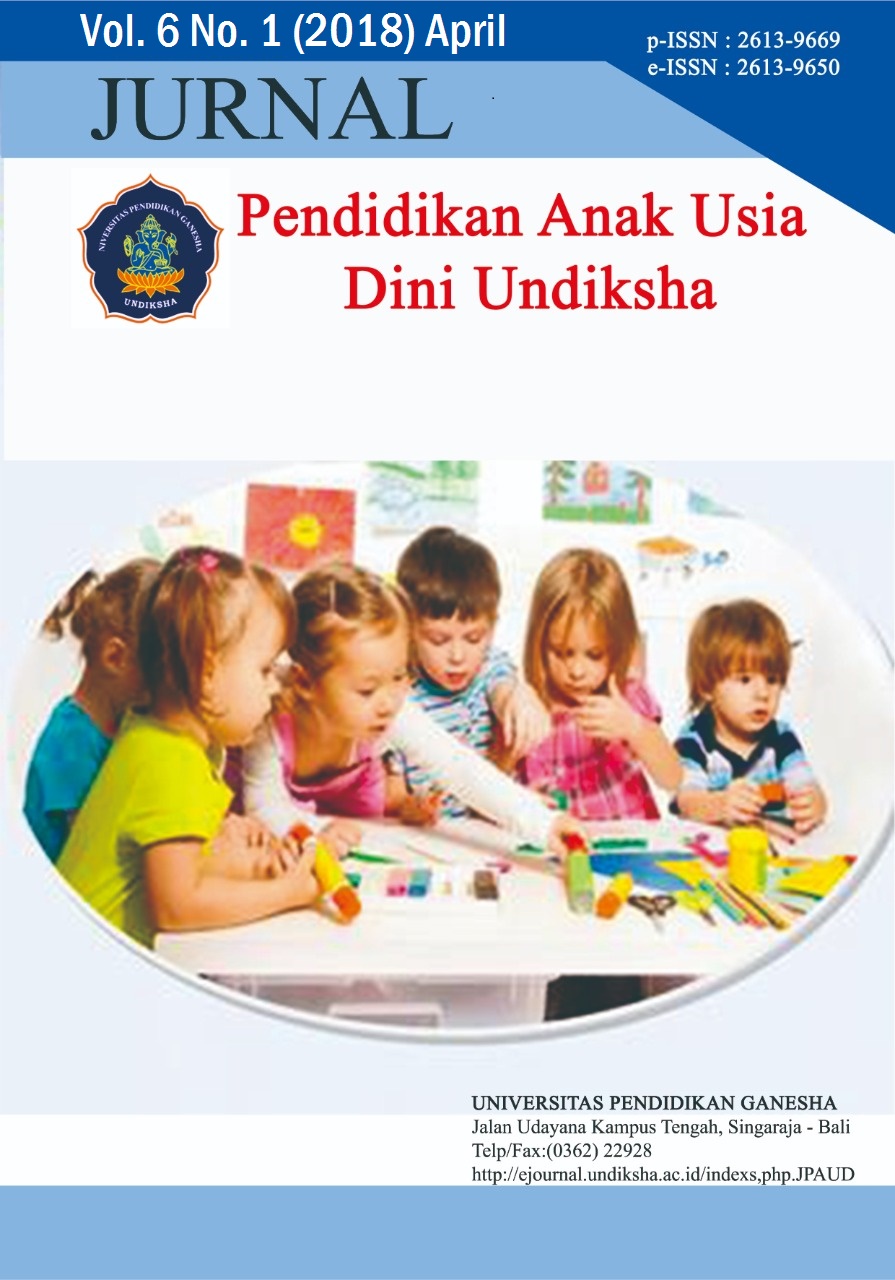PENGARUH METODE SOSIODRAMA TERHADAP KEMAMPUAN KOMUNIKASI VERBAL ANAK DENGAN TUNAGRAHITA DI PAUD DHARMA WANGSA DENPASAR BARAT TAHUN PELAJARAN 2017/2018
DOI:
https://doi.org/10.23887/paud.v6i1.15084Abstract
Penelitian ini bertujuan untuk mengetahui pengaruh metode sosiodrama terhadap kemampuan komunikasi verbal anak tunagrahita kelompok A di PAUD Dharma Wangsa Denpasar Barat. Jenis penelitian ini adalah rancangan eksperimen kasus tunggal dengan 1 subjek anak dengan tunagrahita dalam kategori ringan yang memiliki IQ 58 pada skala Binet. Penelitian ini dilaksanakan dalam tiga fase, yaitu fase baseline (A1), fase perlakuan/treatment (B), dan fase baseline (A2). Data dikumpulkan menggunakan metode observasi dengan instrumen lembar observasi berupa checklist. Data hasil penelitian dianalisis menggunakan metode analisis statistik deskriptif dan penyajian data dipaparkan secara visual (visual inspection). Hasil analisis data menunjukkan kecenderungan membaik kemampuan komunikasi verbal subjek yang terlihat dari adanya peningkatan kemampuan komunikasi verbal subjek dari fase baseline (A1) dengan rerata 25,8 menjadi 60,6 pada saat diterapkannya treatment pada fase penerapan (B), dan pada fase baseline (A2) saat penerapan metode sosiodrama dihentikan dengan rerata 44,4. Rentangan stabilitas penelitian ini pada fase baseline (A1) sebesar 60%, fase treatment (B) sebesar 80%, serta fase baseline (A2) sebesar 60%. Berdasarkan hasil penelitian tersebut, dapat disimpulkan bahwa metode sosiodrama berpengaruh terhadap peningkatan kemampuan komunikasi verbal pada anak tunagrahita di PAUD Dharma Wangsa Denpasar Barat.Kata Kunci : sosiodrama, komunikasi verbal, tunagrahita
This study aims to determine the effect of the sociodrama method on verbal communication ability of children with mental retardation group A in Dharma Wangsa Kindergarten, West Denpasar. Kind of this research is single case experimental design with 1 subject of mental retardation in the mild category that has an IQ of 58 on the Binet scale. This research was implemented in three phases which are the baseline phase (A1), the intervensi phase (B), and the baseline phase (A2). The collection of data research using observation with instrument checklist observation. Data of research result were analyzed using descriptive statistical analysis method and data are presented visually (visual inspection). The result of data analysis showed a tendency to improve the subject’s verbal communication skills, as evidenced by the increase verbal communication skills from baseline phase (A1) with a mean of 25,8 to 60,6 in the implementation phase of treatment (B), and baseline phase (A2) when the implementation of the sociodrama method is stopped with a mean 44,4. The range of stability of this study at the baseline phase of 60%, treatment phase (B) of 80%, and baseline phase (A2) of 60%. Based on these results it can be concluded that the sociodrama method affects verbal communication in the child’s with mental retardation in Dharma Wangsa Kindergarten, West Denpasar.
keyword : sociodrama, verbal communication, mental retardation
Downloads
Published
2018-07-26
How to Cite
., K. M. P. D., ., L. A. T. S., & ., D. I. W. S. S. M. (2018). PENGARUH METODE SOSIODRAMA TERHADAP KEMAMPUAN KOMUNIKASI VERBAL ANAK DENGAN TUNAGRAHITA DI PAUD DHARMA WANGSA DENPASAR BARAT TAHUN PELAJARAN 2017/2018. Jurnal Pendidikan Anak Usia Dini Undiksha, 6(1), 54–63. https://doi.org/10.23887/paud.v6i1.15084
Issue
Section
Articles
License
Authors who publish with the Jurnal Pendidikan Anak Usia Dini Undiksha agree to the following terms:
- Authors retain copyright and grant the journal the right of first publication with the work simultaneously licensed under a Creative Commons Attribution License (CC BY-SA 4.0) that allows others to share the work with an acknowledgment of the work's authorship and initial publication in this journal.
- Authors are able to enter into separate, additional contractual arrangements for the non-exclusive distribution of the journal's published version of the work (e.g., post it to an institutional repository or publish it in a book), with an acknowledgment of its initial publication in this journal.
- Authors are permitted and encouraged to post their work online (e.g., in institutional repositories or on their website) prior to and during the submission process, as it can lead to productive exchanges, as well as earlier and greater citation of published work. (See The Effect of Open Access)











